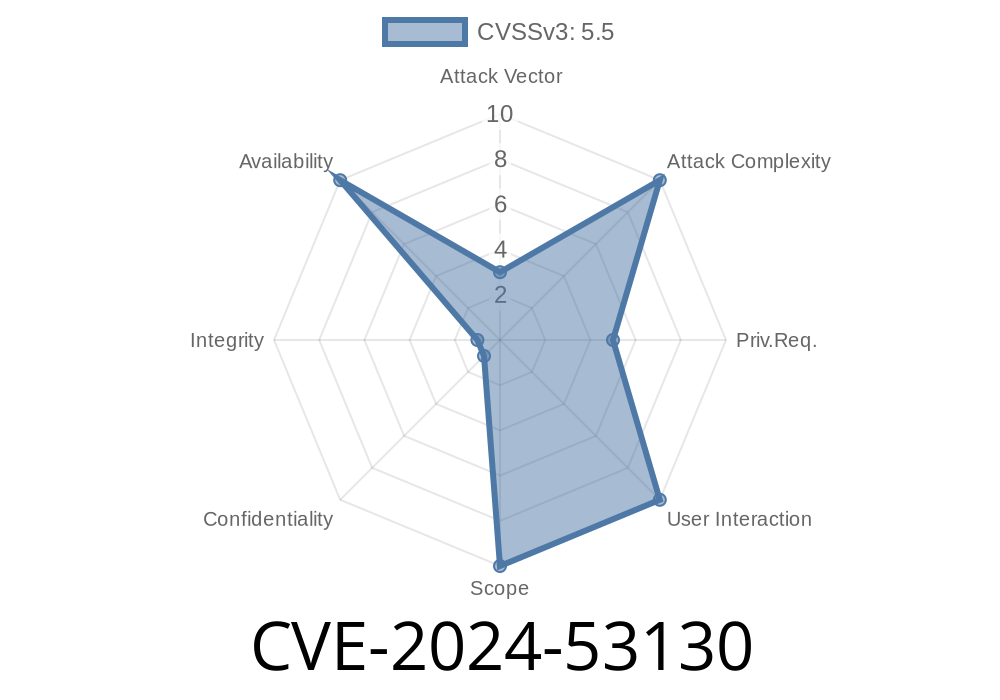CVE-2024-53130 is a recently resolved Linux kernel vulnerability affecting the NILFS2 filesystem. This bug could lead to a kernel crash due to a NULL pointer dereference or, on hardened systems like those running Kernel Address Sanitizer (KASAN), a general protection fault. The root cause is how the block:block_dirty_buffer tracepoint interacts with NILFS2’s buffer handling.
This post breaks down how the bug happens, shows real code snippets from the patch, and explains how an attacker *might* exploit this to cause a denial of service (crash), along with references and details.
What is the Problem?
The kernel’s buffer management code, especially when used by NILFS2, manipulates metadata blocks with functions like mark_buffer_dirty(). A tracepoint (block:block_dirty_buffer) added for observability can accidentally trigger a NULL pointer dereference if the buffer’s device pointer (bh->b_bdev) is uninitialized.
In some cases, NILFS2’s code does not set bh->b_bdev.
- If the buffer appears ‘uptodate’, NILFS2 skips setting this pointer—even though something later could dirty it and log events.
When this combination hits, the kernel will crash with a null deref. Notably, this can be provoked by normal filesystem methods if crafted carefully. The issue is subtle but serious, since user input could conceivably trigger a crash on systems using NILFS2.
Buffer Re-Use Rocketry:
During internal operations (say, mount/umount, or heavy writes), buffer_heads may be detached and re-attached, sometimes skipping proper initialization of the b_bdev field.
Tracepoint Assumption:
The tracepoint code inside mark_buffer_dirty() assumes every buffer has its block device pointer set.
Crash Trigger:
If a buffer with a NULL b_bdev pointer gets marked as dirty, dereferencing this pointer in the trace handler kills the kernel.
Highlighted Patch Fragment
The upstream Linux kernel fix commit (by Ryusuke Konishi) ensures buffers always get their device pointer on creation:
// Before fix: nilfs_grab_buffer()
if (!buffer_uptodate(bh))
bh->b_bdev = NILFS_SB(sb)->s_bdev;
// After fix: always set block device
bh->b_bdev = NILFS_SB(sb)->s_bdev;
This means *every* buffer (new or recycled) now gets the correct device pointer, regardless of uptodate.
Proof-of-Concept & Exploitability
Can you exploit CVE-2024-53130 for more than a crash?
Currently, exploitation is limited to a denial of service (kernel crash)
- The bug can be triggered by creating situations where special crafted NILFS2 volumes have pages with uptodate status restored, but without the device pointer.
- By repeated mount/unmounts, forced IO, or possibly try_to_free_buffers() churn, the dangerous state could be encouraged.
- As soon as the buffer is dirtied (e.g., by a regular write), the crash is triggered via the tracepoint dereferencing the NULL pointer.
No remote code execution or privilege escalation is possible so far. This is a local DOS.
Sample dmesg output on crash
[ 123.456789] BUG: kernel NULL pointer dereference, address: 000000000000002
[ 123.456800] RIP: 001:mark_buffer_dirty+x1a7/x230
...
References
- Upstream Fix Commit on GitHub
- NILFS2 project site
- Linux Kernel Buffer Head Docs
- KASAN Wiki
- Linux block device tracepoints
How to Fix
Mitigation:
Upgrade your kernel to a version merging the fix. Check for security updates from your distro vendor.
Manual Patch:
If you manage a custom kernel, apply this change to fs/nilfs2/btree.c (or wherever your kernel sources store NILFS2 helpers):
static struct buffer_head *nilfs_grab_buffer(...) {
struct buffer_head *bh = ...;
bh->b_bdev = NILFS_SB(sb)->s_bdev; // make sure it's always set now!
...
}
Conclusion
CVE-2024-53130 is an example of how subtle pointer logic in the kernel’s filesystem internals can threaten whole-system stability. While not a hyper-exploitable bug, a local user could trigger a kernel panic, and should not be ignored on multi-user Linux boxes using NILFS2.
> Action: Update as soon as possible and avoid exposing NILFS2 to untrusted local users in the interim.
If you want to learn more about tracepoints or NILFS2 internals, start with the upstream docs and follow the references above!
*Stay tuned to kernel.org for future advisories on related kernel bugs.*
Timeline
Published on: 12/04/2024 15:15:12 UTC
Last modified on: 12/11/2024 15:01:08 UTC
